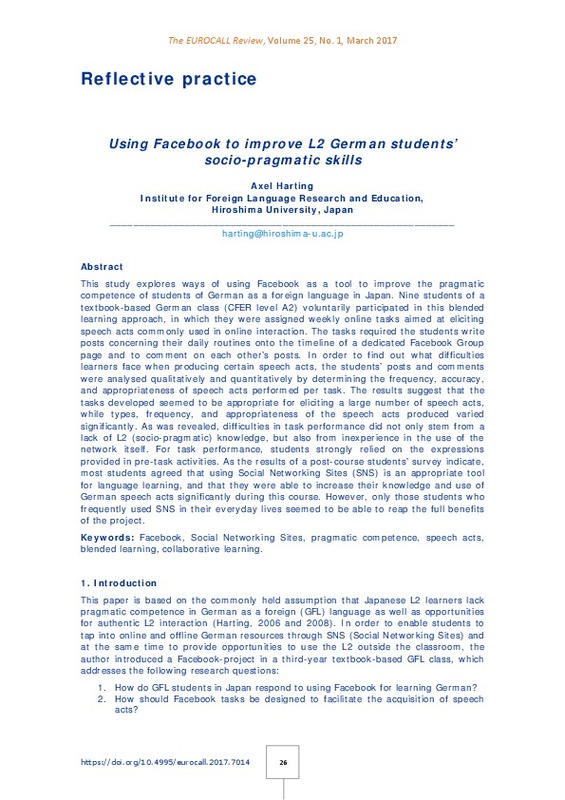JavaScript is disabled for your browser. Some features of this site may not work without it.
Buscar en RiuNet
Listar
Mi cuenta
Estadísticas
Ayuda RiuNet
Admin. UPV
Using Facebook to improve L2 German students’ socio-pragmatic skills
Mostrar el registro sencillo del ítem
Ficheros en el ítem
| dc.contributor.author | Harting, Axel
|
es_ES |
| dc.date.accessioned | 2017-07-04T10:40:47Z | |
| dc.date.available | 2017-07-04T10:40:47Z | |
| dc.date.issued | 2017-04-28 | |
| dc.identifier.uri | http://hdl.handle.net/10251/84413 | |
| dc.description.abstract | [EN] This study explores ways of using Facebook as a tool to improve the pragmatic competence of German as a foreign language students in Japan. Nine students of a textbook-based German class (CFER level A2) voluntarily participated in this blended learning approach, in which they were assigned weekly online tasks aimed at eliciting speech acts commonly used in online interaction. The tasks required the students write posts concerning their daily routines onto the timeline of a dedicated Facebook Group page and to comment on each other’s posts. In order to find out what difficulties learners face when producing certain speech acts, the students’ posts and comments were analysed qualitatively and quantitatively by determining the frequency, accuracy, and appropriateness of speech acts performed per task. The results suggest that the tasks developed seemed to be appropriate for eliciting a large number of speech acts, while types, frequency, and appropriateness of the speech acts produced varied significantly. As was revealed, difficulties in task performance did not only stem from a lack of L2 (socio-pragmatic) knowledge, but also from inexperience in the use of the network itself. For task performance students strongly relied on the expressions provided in pre-task activities. As the results of a post-course students’ survey indicate, most students agreed that using Social Networking Sites is an appropriate tool for language learning, and that they were able to increase their knowledge and use of German speech acts significantly during this course. However, only those students who frequently used SNS in their everyday lives seemed to be able to reap the full benefits of the project. | es_ES |
| dc.language | Inglés | es_ES |
| dc.publisher | Universitat Politècnica de València | |
| dc.relation.ispartof | The EuroCALL Review | |
| dc.rights | Reconocimiento - No comercial - Sin obra derivada (by-nc-nd) | es_ES |
| dc.subject | es_ES | |
| dc.subject | Social Networking Sites | es_ES |
| dc.subject | Pragmatic competence | es_ES |
| dc.subject | Speech acts | es_ES |
| dc.subject | Blended learning | es_ES |
| dc.subject | Collaborative learning | es_ES |
| dc.title | Using Facebook to improve L2 German students’ socio-pragmatic skills | es_ES |
| dc.type | Artículo | es_ES |
| dc.date.updated | 2017-07-04T10:30:22Z | |
| dc.identifier.doi | 10.4995/eurocall.2017.7014 | |
| dc.rights.accessRights | Abierto | es_ES |
| dc.description.bibliographicCitation | Harting, A. (2017). Using Facebook to improve L2 German students’ socio-pragmatic skills. The EuroCALL Review. 25(1):26-35. https://doi.org/10.4995/eurocall.2017.7014 | es_ES |
| dc.description.accrualMethod | SWORD | es_ES |
| dc.relation.publisherversion | https://doi.org/10.4995/eurocall.2017.7014 | es_ES |
| dc.description.upvformatpinicio | 26 | es_ES |
| dc.description.upvformatpfin | 35 | es_ES |
| dc.type.version | info:eu-repo/semantics/publishedVersion | es_ES |
| dc.description.volume | 25 | |
| dc.description.issue | 1 | |
| dc.identifier.eissn | 1695-2618 |








